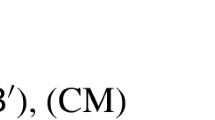Abstract
We prove completeness and decidability results for a family of combinations of propositional dynamic logic and unimodal doxastic logics in which the modalities may interact. The kind of interactions we consider include three forms of commuting axioms, namely, axioms similar to the axiom of perfect recall and the axiom of no learning from temporal logic, and a Church–Rosser axiom. We investigate the influence of the substitution rule on the properties of these logics and propose a new semantics for the test operator to avoid unwanted side effects caused by the interaction of the classic test operator with the extra interaction axioms.
Similar content being viewed by others
References
Blackburn P., de Rijke M., Venema Y. (2001). Modal logic, Vol. 53 of Cambridge tracts in theoretical computer science. Cambridge, Cambridge Univ. Press
Fagin, R., Halpern, J. Y., Moses, Y., & Vardi, M. Y. (1995). Reasoning about knowledge. MIT Press.
Fischer M.J., Ladner R.E. (1979). Propositional dynamic logic of regular programs. Journal of computer and System Sciences 18(2): 194–211
Gabbay, D. M., Kurucz, A., Wolter, F., & Zakharyaschev, M. (2003). Many-dimensional modal logics: Theory and applications, Vol. 148 of studies in logic and the foundations of mathematics. North-Holland.
Gabbay D.M., Shehtman V. (1998). Products of modal logics, Part 1. Logic Journal of the IGPL 6(1): 73–146
Harel D., Kozen D., Tiuryn J. (2000). Dynamic logic, Foundations of Computing. MIT Press.
Herzig A., Longin D. (2000). Belief dynamics in cooperative dialogues. Journal of Semantics 17(2): 91–118
Kracht M., Wolter F. (1991). Properties of independently axiomatizable bimodal logics. Journal of Symbolic Logic 56(4): 1469–1485
Kracht M., Wolter F. (1997). Simulation and transfer results in modal logic—a survey. Studia Logica 59(2): 149–177
Meyer J.J.C., van der Hoek W., van Linder B. (1999). A logical approach to the dynamics of commitments. Artificial Intelligence 113(1–2): 1–40
Ohlbach, H. J. (1996). scan—elimination of predicate quantifiers: System description. In M. A. McRobbie & J. K. Slaney (Eds.), Proceedings of the 13th conference on automated deduction (CADE-13), Vol. 1104 of Lecture notes in artificial intelligence (pp. 161–165). Springer.
Plaza, J. A. (1989). Logic of public communications. In: M. L. Emrich, M. S. Pfeifer, M. Hadzikadic, & Z. W. Ras (Eds.), Proceedings of the 4th International symposium on methodologies for intelligent Systems (ISMIS’89), pp. 201–216.
Rao, A. S., & Georgieff, M. P. (1991). Modeling rational agents within a BDI-architecture. In R. E. Fikes & E. Sandewall (Eds.), Proceedings of the 2nd international conference on the principle of knowledge representation and reasoning (KR’91), pp. 473–484.
Sahlqvist, H. (1975). Completeness and correspondence in the first and second order semantics for modal logic. In S. Kanger (Ed.), Proceedings of the 3rd scandinavian logic symposium, pp. 110–143.
Schmidt R.A., Tishkovsky D. (2002). On axiomatic products of PDL and S5: substitution, tests and knowledge. Bulletin of the Section of Logic 31(1): 27–36
Schmidt, R. A. & Tishkovsky, D. (2003). Combining dynamic logic with doxastic modal logics. In P. Balbiani, N.-Y. Suzuki, F. Wolter, & M. Zakharyaschev (Eds.), Advances in modal logic, (Vol. 4, pp. 371–392). King’s College Publ.
Schmidt, R. A. & Tishkovsky, D. (2004). Multi-agent dynamic logics with informational test. Annals of Mathematics and Artificial Intelligence, 42(1–3), 5–36. Special issue on Computational Logic in Multi-Agent Systems.
van der Hoek, W. (2001). Logical foundations of agent-based computing. In M. Luck, V. Marík, O. Stepánková, & R. Trappl (Eds.), Multi-agent systems and applications, Vol. 2086 of Lecture notes in artificial intelligence, (pp. 50–73). Springer.
Wolter F. (2000). The product of converse PDL and polymodal K. Journal of Logic and Computation 10(2): 223–251
Zakharyaschev, M., Wolter, F., & Chagrov, A. (2001). Advanced modal logic. In D. M. Gabbay & F. Guenthner (Eds.), Handbook of philosophical logic (Vol. 3, pp. 83–266). Kluwer (2nd ed.).
Author information
Authors and Affiliations
Corresponding author
Additional information
This paper is a revised and extended version of Schmidt and Tishkovsky (2003).
Rights and permissions
About this article
Cite this article
Schmidt, R.A., Tishkovsky, D. On combinations of propositional dynamic logic and doxastic modal logics. J of Log Lang and Inf 17, 109–129 (2008). https://doi.org/10.1007/s10849-007-9041-6
Received:
Accepted:
Published:
Issue Date:
DOI: https://doi.org/10.1007/s10849-007-9041-6




